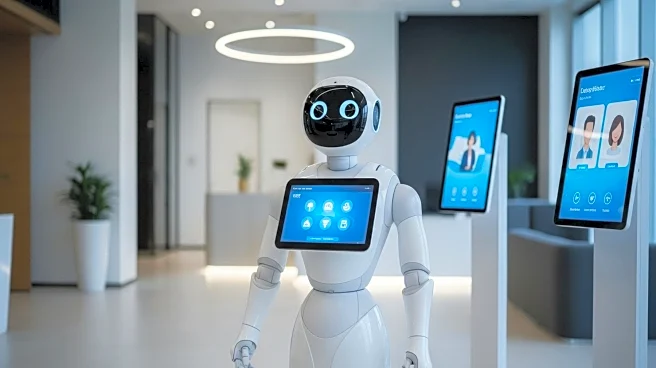What's Happening?
The AI receptionist workforce has seen significant expansion with the introduction of five new virtual receptionist platforms. Wildix launched Wilma AI, an agentic AI platform functioning as a virtual receptionist, capable of handling voice, text, and web inquiries, scheduling appointments, and escalating to human agents. CallMiner introduced OmniAgent, a virtual agent that interacts with customers across multiple channels, while 8x8 updated its Intelligent Customer Assistant with features like Knowledge AI and xApps for channel-switching during interactions. Jobber's virtual receptionist targets small service businesses, integrating with its SaaS products to schedule jobs and take messages. Phreesia launched VoiceAI, a healthcare-specific virtual agent. These developments reflect a growing trend in utilizing AI to automate customer service interactions, providing businesses with tools to enhance customer experience and streamline operations.
Why It's Important?
The expansion of AI receptionist platforms is crucial for businesses seeking to improve customer experience and operational efficiency. By automating routine interactions, these AI tools allow human staff to focus on more complex tasks, potentially reducing labor costs and increasing productivity. In healthcare, AI receptionists can manage high volumes of calls, improving patient experience and clinic efficiency. For small service businesses, AI receptionists offer immediate connectivity to service providers, enhancing customer satisfaction. The ability to personalize interactions and analyze customer data can lead to more tailored services and improved business strategies. As AI technology continues to evolve, its integration into customer service represents a significant shift towards more automated and efficient business operations.
What's Next?
The continued development and integration of AI receptionists are likely to lead to further advancements in customer service automation. Businesses may increasingly adopt these technologies to enhance customer interactions and streamline operations. As AI systems become more sophisticated, they could handle more complex tasks, reducing the need for human intervention in routine inquiries. Companies might explore additional applications of AI in customer service, such as predictive analytics and personalized marketing. Stakeholders, including businesses and technology developers, will likely focus on improving AI capabilities and addressing privacy concerns associated with automated interactions. The evolution of AI receptionists could also influence employment patterns in customer service roles, prompting discussions on workforce adaptation and training.
Beyond the Headlines
The rise of AI receptionists highlights broader implications for the workforce and customer service industry. As AI systems take on more tasks traditionally performed by humans, there may be ethical considerations regarding job displacement and the need for workforce retraining. The personalization of AI interactions raises questions about data privacy and the balance between convenience and security. Additionally, the integration of AI in customer service could lead to cultural shifts in how businesses interact with customers, emphasizing efficiency and personalization. Long-term, the adoption of AI receptionists may drive innovation in customer service strategies, influencing industry standards and consumer expectations.









